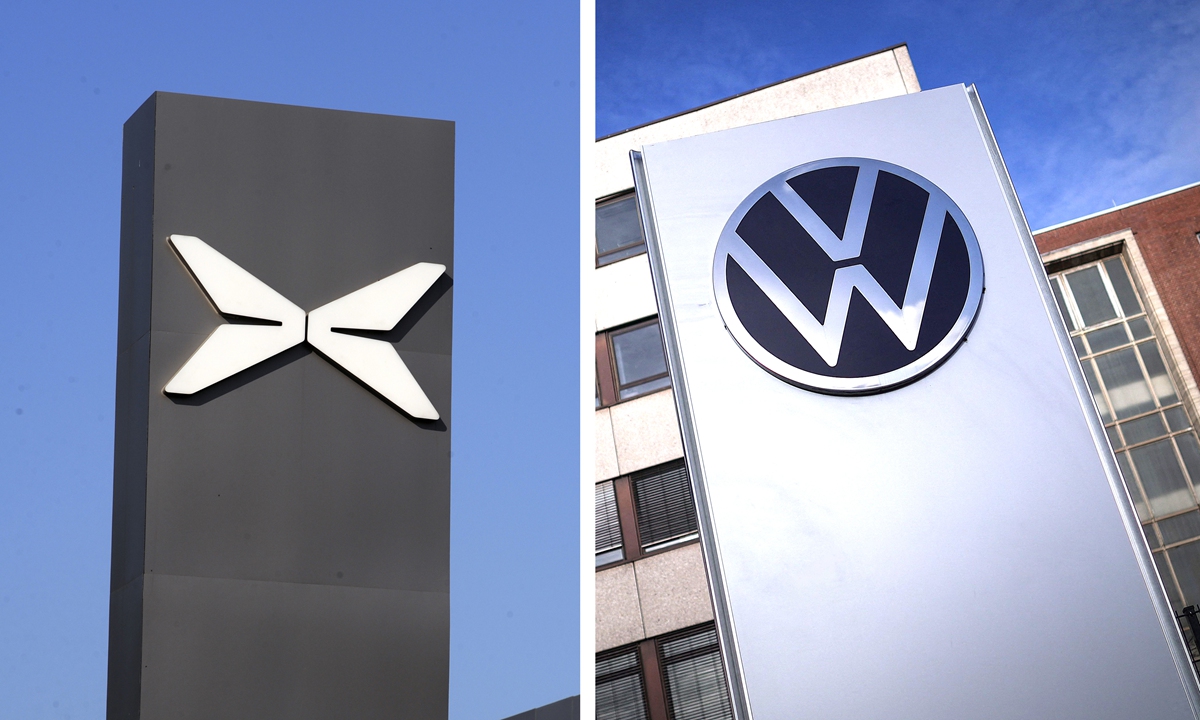Volkswagen-XPENG collaboration offers valuable insights for China-Europe cooperation: Global Times editorial

Photo: GT
Chinese electric vehicle maker XPENG has once again reached a significant collaboration with German automobile giant Volkswagen. On Monday, both companies announced the signing of a Memorandum of Understanding (MoU) for strategic collaboration on a super-fast charging networks in China. This partnership aims to build one of the largest super-fast charging networks in China. Through this strategic collaboration, more than 20,000 charging piles operated by both companies, spanning 420 cities in China, will be made available to customers of both XPENG and Volkswagen Group China.
Under the MoU, the charging networks of the two companies will realize data interconnection through their respective vehicle systems, mobile phone apps and charging devices. This collaboration will not only significantly enhance the charging experience for customers of both brands, but also help elevate the service offerings of both companies to a new level. After the release of the information, the stock prices of Volkswagen and XPENG rose on Monday, indicating the market's confidence in the partnership.
This is a classic example of a win-win partnership. Since Volkswagen's $700 million investment in XPENG in 2023 and the signing of their framework agreement on strategic technical collaboration, their relationship has evolved from technical collaboration to resource sharing, with the cooperation gradually upgrading.
Volkswagen has extensive experience in automotive structure design and vehicle body, while XPENG leads in automatic drive and new energy technology. Volkswagen has long history and solid market foundation while XPENG rises as a "new force" in the automotive industry. Their collaboration will help both brands stand out in intense competition. It shows that even on a competitive track where people chase after each other, there can be mutual benefit and achievement.
The collaboration between Volkswagen and XPENG is not an isolated case, as similar partnerships between Chinese and European automakers have emerged one after another in recent years. For example, BYD has partnered with British bus manufacturer ADL to promote electric buses. Chery and Spain's Ebro-EV Motors established a joint venture in the Barcelona Free Trade Zone, while BMW has worked with CATL and other companies to develop electric vehicle batteries, and explored frontier technologies like artificial intelligence and solid-state batteries with Tsinghua University. Additionally, the partnership between multinational automotive company Stellantis and Chinese Leapmotor, as well as the deep integration of SAIC Motor into European market after acquiring MG Motor, are generating significant momentum in global markets. These collaborations are boosting confidence in the industry.
It's important to note that the competitive collaboration between Chinese and European automakers is not limited to the Chinese market - it can also be realized in other markets, including in Europe.
For example, the severe shortage of charging stations has long been a pain point for the development of electric vehicles in Europe. Partnerships like the collaboration between Volkswagen and XPENG will also offer Europe more help in breaking through relevant bottlenecks. In addition to charging networks, many other experiences and technologies, including electronic architecture, applications, and operational experience, can be transferred from the Chinese market to the European market.
In the past, many joint-venture car companies established R&D centers in China, bringing advanced foreign technologies and experiences into the country for localized practices, and achieved great success. Today, China has taken the lead in emerging technologies, and this process can similarly continue to create mutual win-win in reverse.
Some people in Europe are still not quite accustomed to this process and even adopt a defensive posture, viewing China's rapid development in new energy technologies as a "threat" rather than an opportunity.
However, as the Chinese saying goes, "The duck knows first when the river becomes warm in spring." Companies with the keenest sense of market trends and deep insights into future developments have already taken action, responding to fierce market competition through open collaboration and achieving results. When it comes to turning crises into opportunities in the new energy race, they have greater voice.
Ferdinand Dudenhöffer, a renowned automotive expert, said in an interview with the Xinhua News Agency that international cooperation has always been a key principle for the development of the automotive industry. Strengthening automotive industry cooperation between Europe and China will pave a "golden road" for industrial growth. Similarly, Luca de Meo, the CEO of French automaker Renault, said "electrification" in Europe would be difficult "without good cooperation" with China.
The automotive industry has a highly extensive supply chain, spanning from raw material extraction to after-sales services. This chain not only represents opportunities for industrial development but also for collaborative innovation. At the 2024 Supply Chain Expo, numerous new products and technologies from Chinese car companies highlighted the close cooperation between Chinese and foreign industrial supply chains.
Thanks to the advantages of China's new energy vehicle supply chain, European companies are also sourcing key components like Chinese-made new energy batteries for use in their vehicles. This cooperation between upstream and downstream automotive enterprises in China and abroad has created an "overseas supply chain." The potential for cooperation between European and Chinese car companies extends far beyond individual technologies or component transactions; rather, it lies in the profound integration within the global supply chain. This deep integration generates a strong synergistic effect, continuously delivering dividends of cooperation.
In 2024, the development and cooperation between the Chinese and European automotive industries experienced both successes and challenges. In such times, it becomes even more crucial to clarify the better path forward for both sides. The recently released Flagship Report on the Development of Chinese Enterprises in the EU 2024/2025 highlights that Chinese enterprises remain optimistic about the mid-to long-term prospects for China-EU trade and hope that the EU will create a fair, just and predictable market environment for Chinese enterprises in Europe.
It is hoped that some European politicians can set aside their biases against Chinese cars and create conditions for mutual success between Chinese and European automotive companies in their competition and cooperation.

